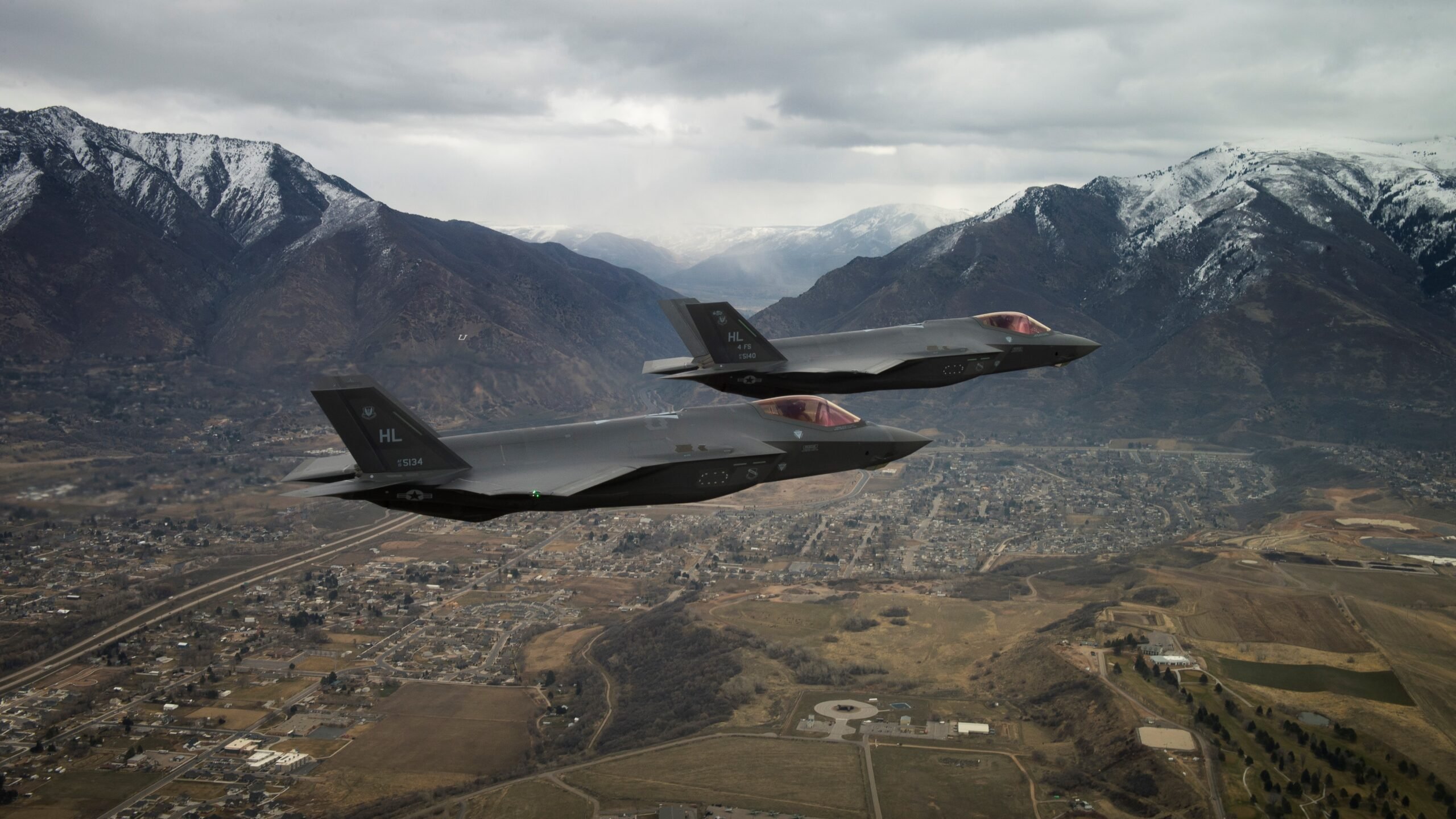
Two U.S. Air Force F-35A Lightning IIs, assigned to the 4th Fighter Squadron from Hill Air Force Base, Utah, fly over the base and the surrounding area on Feb 14, 2018. The F-35A is the U.S. Air Force’s latest fifth-generation fighter. (U.S. Air Force/Staff Sgt. Andrew Lee)
WASHINGTON — The Pentagon has temporarily stopped accepting deliveries of the Lockheed Martin-made F-35 after it found that an alloy used in magnets on the jet’s turbomachine pumps was produced in China.
The F-35 program office has assessed that the Chinese alloy does not present a safety or security risk that could expose the stealth jet to cyber attacks or other malfeasance, and an alternative source for the alloy has already been identified, F-35 JPO spokesman Russell Goemaere said in a statement. As a result, there are no plans to ground the F-35 fleet or return jets already accepted to Lockheed.
However, it is unclear when F-35s with magnets made from the new alloy will begin rolling off the production line, and if the Chinese alloy is found to violate defense acquisition regulations, it would take a national defense waiver for deliveries to resume.
The Defense Contract Management Agency first notified the F-35 joint program office (JPO) about the potential issue on Aug. 19, Goemaere said.
The F-35 turbomachine, which is manufactured by Honeywell, provides power to start the engine and during ground maintenance. Honeywell was informed by its lube pump supplier that one of its magnet suppliers had used a cobalt and samarium alloy manufactured in China, said Lockheed Martin spokeswoman Laura Siebert.
The DCMA and the program office suspended F-35 deliveries on Aug. 31 to allow time for the Defense Department to investigate whether use of the alloy violated the Defense Federal Acquisition Regulations Supplement, according to a source with knowledge of the program.
If the Chinese alloy is found to be noncompliant with DFARS, the Undersecretary of Defense for Acquisition and Sustainment — in this case, Bill LaPlante — can make a written certification that accepting the F-35s is necessary to the national security interests of the United States.
That investigation has not yet been completed, although the program office received a “formal disclosure” of potential noncompliance from the contractor on Sept. 2, Goemaere said. “Further investigation is underway to understand the causal factors for the non-compliance and to establish corrective action.”
Siebert said, “Honeywell has stopped work with the supplier providing alloy, and an alternative U.S. source is already on order with anticipated delivery next month.” However, it is unclear how long it will take for the new alloy to make its way from the lube pump supplier to Honeywell to Lockheed Martin’s F-35 production line, and Siebert noted that “we do not know the length of the delivery pause.”
Lockheed is currently working with the Pentagon to furnish any information that might be needed for a national defense waiver, if the Chinese alloy is ultimately found to be noncompliant, Siebert said.
“We are working with our partners and DoD to ensure contractual compliance within the supply chain,” Siebert said. “The magnet has no visibility or access to any sensitive program information. The F-35 remains safe for flight, and we are working with the DoD to resolve the issue as quickly as possible to resume deliveries.”
Lockheed has delivered 88 F-35s this year so far and remains on target to complete anywhere from 148 to 153 F-35s in 2022, Siebert said. Completed aircraft that have not yet been delivered will remain at Lockheed’s Fort Worth production facility.
In a ‘world first,’ DARPA project demonstrates AI dogfighting in real jet
“The potential for machine learning in aviation, whether military or civil, is enormous,” said Air Force Col. James Valpiani. “And these fundamental questions of how do we do it, how do we do it safely, how do we train them, are the questions that we are trying to get after.”


























